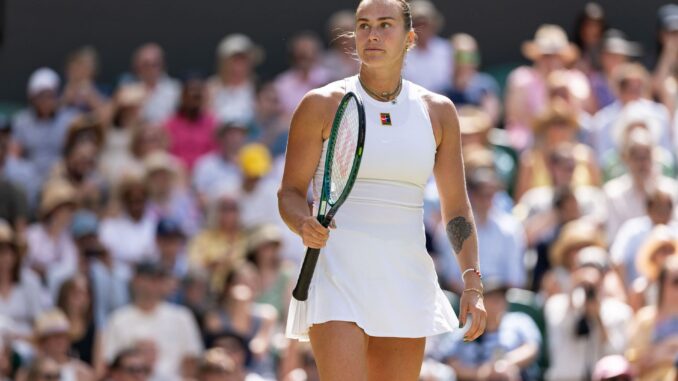
Aryna Sabalenka, the world’s No. 1 women’s tennis player, has long been celebrated for her thunderous forehand, relentless competitiveness, and infectious charisma. Yet, in a candid moment shared through a YouTube vlog, the Belarusian star peeled back the glamorous facade of professional tennis to reveal its grueling emotional underbelly. After a heartbreaking semifinal loss to Amanda Anisimova at Wimbledon 2025, Sabalenka laid bare the psychological weight of a career where every outcome feels like a verdict on her worth. “I think it’s important to go and have fun and enjoy life. But it’s so f—— annoying about being an athlete, honestly. All your life depends on your result,” she confessed, her voice heavy with the sting of defeat. “You win and you are the happiest person that you can be. You just enjoy, life feels so good. But when you lose it’s just tough to enjoy.”
Sabalenka’s 2025 season has been a rollercoaster of triumphs and near-misses. With a 47–9 record and three titles, including Miami and Madrid, she’s cemented her dominance, holding the top ranking for 40 consecutive weeks. Her powerful baseline game and 135-mph serve have made her a favorite at every tournament, yet the elusive fourth Grand Slam title remains out of reach. She reached the finals of the Australian Open and French Open, falling to Madison Keys and Coco Gauff, respectively, and suffered a gut-wrenching 6-4, 4-6, 6-4 defeat to Anisimova at Wimbledon, her third straight semifinal exit there. “I am going to be there on the beach thinking it’s so beautiful, but I lost. I am such a loser. I hate myself,” she admitted, capturing the raw self-doubt that lingers even during a planned Miami vacation with boyfriend Georgios Frangulis.
The 27-year-old’s honesty resonates with the unique pressures of tennis, where players face intense scrutiny in front of thousands, with millions more watching globally. “It’s like you are constantly living your life in these ups and downs,” she said, reflecting on the emotional whiplash of a sport that ties personal happiness to performance. Her Wimbledon loss, where she led by a break in the third set only to falter on return, was particularly stinging. Anisimova’s unapologetic net-cord winner and early celebration irked Sabalenka, though she later acknowledged it fueled her fight. “She just wanted, I guess, badly to win this match. It’s on her,” Sabalenka noted, choosing grace over grudges. Her post-match press conference showed growth, as she avoided the controversy of her French Open remarks, where she’d downplayed Gauff’s win. “You’re not going to see the Roland Garros press conference, so anyone who was waiting for that can leave right now!” she quipped, sticking out her tongue to lighten the mood.
Sabalenka’s journey hasn’t been without personal trials. The 2019 loss of her father, Sergey, a former ice hockey player who introduced her to tennis, left a lasting impact. “The way he raised me, he always told me that you have to fight. You have to work hard,” she recalled, crediting his resilience for her refusal to quit during a 2022 serving crisis, when she racked up 428 double faults in 55 matches. With coach Anton Dubrov and trainer Jason Stacy, she rebuilt her serve, transforming a weakness into a weapon. Her 2023 Australian Open title, followed by 2024 victories there and at the US Open, showcased her grit. “It took me a lot to get where I am right now, and I’ve had to make a lot of sacrifices,” she said, emphasizing the relentless training and travel that define her career.
As Sabalenka prepares for the US Open, where she’ll defend her 2024 title and compete in mixed doubles with Grigor Dimitrov, her candidness has sparked conversations about mental health in sports. Posts on X echo her sentiments, with fans praising her authenticity: “Aryna’s honesty about the highs and lows is so real.” Her YouTube channel, launched to connect with fans, offers a window into her life, from training to beachside reflections. Despite the pain of losses, Sabalenka remains philosophical. “Every time I was close to completely losing it and start yelling, screaming, smashing the rackets, I kept reminding myself that’s not an option,” she said, showcasing a maturity that could propel her to another Grand Slam glory in New York.
Leave a Reply